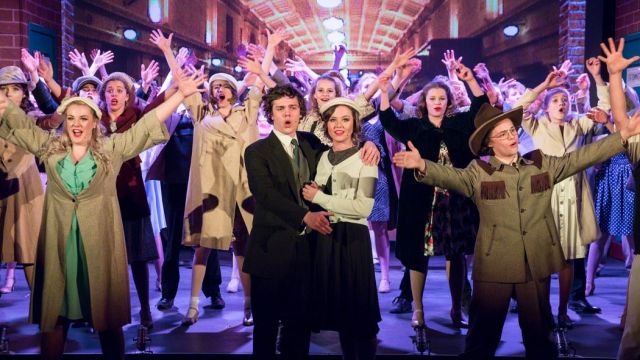42nd Street
Music by Harry Warren. Lyrics by Al Dubin. Directed by Adam Goodburn. Scotch College. 4-13 August, 2016
Though very distinctly the product of a bygone era, there is also something timeless about 42nd Street – which tells the story of a dysfunctional theatre company’s accident-prone efforts to mount a Broadway show during the height of the Great Depression. Though stage technology has changed a great deal since the 1930s, human nature has progressed at a slower pace and anyone who has worked behind the scenes in theatre will likely find that many of the struggles depicted in this musical are easily relatable. Indeed, anyone who has found it a strain to work as part of a team under pressure, alongside people you don’t like, will probably find that many scenes ring true in a way that is both poignant and hilarious. The youthful energy of Scotch College’s production brings out the best in this show and ensures that it never comes across as a museum piece.
The principals are well cast. Tayla Coad brings enough spunk and grit to the role of Peggy, the fresh off the bus ingénue, that the character’s wide-eyed wonderment at the glamour of Broadway never comes across as cloying. In contrast, Paris Anderson is a delectable slice of ham n’ cheese as the overbearing star, Dorothy, clearly revelling in the diva antics of her character. Jordan Tomljenovic has ditzy, goofball charm to spare as the utterly clueless leading man and Tayla Prime radiates maternal warmth as the experienced chorus girl who often finds herself assigned the role of mediator between conflicting veterans and mentor to unseasoned talent.

Youth Theatre requires that the audience be generous in their suspension of disbelief and it is hard for even the most talented teenager to effectively play a burnt-out and world-weary character. Lachlan Williams does about as well as can be expected in the role of ageing director Julian, though there are times when in attempting to act cynical, he comes across as merely petulant. Still, he is poignantly effective in the scenes that call for the character to show some romantic vulnerability.
The quality of singing is quite consistently strong and musical director, Anthony Hubmayer provides robust arrangements of such familiar standards as “You’re Getting To Be A Habit With Me”, “We’re In The Money” and the show’s title song. The large dance ensemble are tightly co-ordinated, most impressive given that there are in excess of 30 tappers on stage in some scenes. Choreographer Linda Williams is to be commended for pulling off routines on a such a huge scale, but without overwhelming the dramatic integrity of the story.

Sets are very simple, but sufficiently evocative and the production makes skilful use of video projection which incorporates newsreel footage from the 1930s. Scene transitions are swift and fluid, ensuring that the production moves along at a brisk pace.
Overall, this is a class act and fans of the material shouldn’t let the fact that this is a youth theatre production put them off seeing this stylish presentation of a classic show.
Benjamin Orchard

